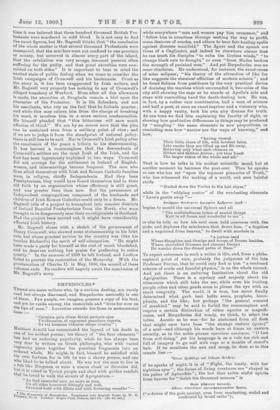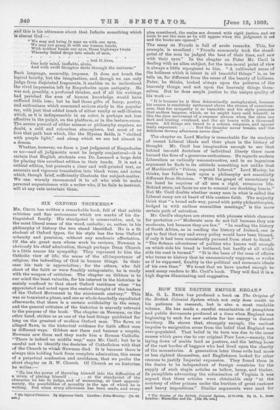EMPEDOCLES.*
Tannn.are some writers who, by a curious destiny, are rarely
read but always discussed, and Empedocles assuredly is one of them. Few people, we imagine, possess a copy of his text, and yet he ranks among the immortals and "lives for ever on the lips of men." Lucretius records his fame in monumental lines
"Carmine quiu etiam divini pectoris ()jug Vociferantur, at exponunt praeolara reperta, Ut vu x humans vidoatur stirpo crest-us" ; Arattliew Arnold has consecrated the legend of his death in one of his noblest poems ; his theory of " the four elements" 48 had an enduring popularity, while he has always been Very dear to writers on Greek philosophy, who with varied ingenuity piece together his puzzling fragments into an ordered whole. He might, in fact, himself be satisfied with
his own fortune, for in life he was a showy person, and one Who liked to be talked about. He was not the man to live in a tub like Diogenes, or wear a coarse cloak as Socrates did, but it is robed in Tyrian purple and shod with golden sandals that he loved to walk the streets of Agrigentura-
" As God immortal now, no more as man, On all sides honoured fittingly and well,
Crowned both with fillets and with flowering wreaths
fit The Fragments ca. ninpedootes. Translated into Huglieb, Verse by W. 4. ()turd, FLED. London Keenn Paul, Trench, and Co. [4s. GI net.]
while everywhere "men and women pay him reverence," and "follow him in countless throngs seeking the way to profit, some desirous of oracles, and others to hear fair-healing spells against diseases manifold." The figure and the speech are those of a Cagliostro, and indeed he elsewhere claims that lie can teach his .disciples "to calm the tireless winds," "to
change black rain to drought," or even "from Hades beckon the strength of perished mon." And yet Empedocles was no mere charlatan. He understood, for instance, the exact cause of solar eclipses; "his theory of the attraction of like for like suggests the chemical affinities of modern science "; and he freed Selinus from pestilence by the very practical device of draining the marshes which surrounded it, two coins of the city still showing the sage as he stands at Apollo's side and stays with controlling hand the death-dealing bow. He was, in fact, by a rather rare combination, half a man of science and half a poet, at once an exact inquirer and a visionary who, with a happy vanity, took his own airy dreams for truth. At one time we find him explaining the faculty of sight, or showing how qualitative differences in things may be produced by " mingling " the same elements in new proportions, or
reminding men how "narrow are the ways of knowing," and how, "having viewed Their little share of life, with briefest fates, 'Like smoke they are lifted up and flit away, Believing only what each chances on Hither and thither driven ; yet they boast The larger vision of the whole and all."
That is how he talks in his modest scientific mood, but at another moment be becomes the poet-seer. Then he speaks as one who has sat "upon the topmost pinnacles of Truth," who has witnessed the making of a world, and seen baleful
strife "Hurled down the Vorteic to the last abyss," while in the "eddying centre" of the everlasting elements "Love's gentle sway '—
limos/wow ChoTgros ape/Algot liitOporos begins to mould the universal Sphere and all "The multitudinous tribes of mortal things Knit in all forms and wonderful to see"; or else he tells us how his soul once held converse with the gods, and deplores the mischance that drove him, "a fugitive
and a vagabond from heaven," to dwell with mortals in
"a joyless land Whore Slaughter and Grudge and troops of Dooms besides, Where shrivelled Diseases and obscene Decays Do wander down the dismal paths of Bane."
To expect coherence in such a writer is idle, and, from a philo. sophical point of view, probably the judgment of the late Professor Ferrier, that he could only find in him "a confused scheme of crude and fanciful physics," is on the whole correct. And yet there is an enduring fascination about the old Agrigeutine. There is a mystery and majesty about his utterances which still take the ear, while even his trailing purple robes and other gaude seem to please the eye with an exact congruity. The world, it is true, has never finally determined what garb best befits seers, prophets, bier°. phants, and the like; but perhaps "the general consent of mankind" may be said to forbid the commonplace and require a certain distinction of either squalor or magnifi- cence, and Empedocles aid wisely, we think, to select the latter. Ascetic as he was—for he abstained front all flesh that might once have been "the strange vesture (xire;a,)" of a soul—and although his words have at times an austere severity, as in the noble phrase vga-rdcrat Kato:int-or, "0 fast
from evil-doing," yet his language is as a rule too rich and full of imagery to go well with rags or a mantle of camel's hair. If he mentions the sun and moon, he does so in this ornate line :—
'limos 41.43tia5s real laate■pa Zskirt?; if be speaks of night, it is of "Night, the lonely, with her sightless eyes "; the forms of living creatures are "shaped in the palms of Aphrodite"; the law that exiles sinful spirit's front heaven for "thrice ten thousand. seasons" is
oe(Sy Ipitinertta waAattiv,
Maw, irActTie0-0-1 actreerepptrytoolvoy SpKois., "a decree of the gods ancient, oven from everlasting, sealed and confirmed by broad oaths");
and this is his utterance about that Infinite something which is almost God :—
" We may not bring It near us with our eyes, We may not grasp It with our human hands, With neither hands nor eyes, those highways twain Whereby Belief drops into minds of men,
..... • ; but It lives, One holy mind, ineffable, alone, And with swift thoughts darts through the universe."
Such language, assuredly, imposes. It does not touch the logical faculty, but the imagination, and though we can only judge from disjointed fragments, it enables us to understand the vivid impression left by Empodocles upon antiquity. He was not, possibly, a profound thinker, and if all his writings had perished the sum of human knowledge would have suffered little loss ; but he bad those gifts of fancy, poetry, and enthusiasm which commend serious study to the popular ear, with just that added touch of either vanity or self-illusion which, as it is indispensable in an actor, is perhaps not leas effective in the pulpit, on the platform, or in the lecture-room. The severe pursuit of either science or philosophy requires, no doubt, a cold and colourless atmosphere, but most of us love that path best which, like the Elysian fields, is "clothed with purple light," and along which we are led almost in a dream.
Whether, however, we form a just judgment of Empedocles or no—and all judgments must be largely conjectural—it is certain that English students owe Dr. Leonard a large debt for placing this excellent edition in their bands. It is not a critical edition, but presents a clear and well-printed text, an accurate and vigorous translation into blank verse, and notes which, though brief, sufficiently illustrate the subject-matter. We can warmly recommend it to all who wish to make personal acquaintance with a writer who, if he fails to instruct, will at any rate entertain them.











































 Previous page
Previous page